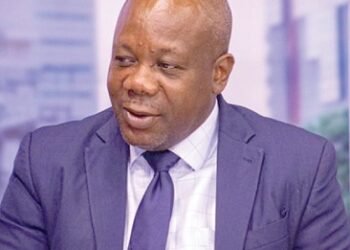Ghana’s Attorney General and Minister for Justice, Dr. Dominic Ayine, has called for tougher measures to eliminate the pervasive activities of “goro boys” in the country’s company registration processes.
According to him, their continued presence not only raises the cost of registering businesses but also entrenches bribery and inefficiency within public institutions. Dr. Ayine made the remarks in Accra during the inauguration of a ten-member Board of Governors for the Office of the Registrar of Companies.
He emphasized that the existence of intermediaries, popularly known as goro boys, undermines the credibility of Ghana’s corporate registration system by forcing citizens and businesses into avoidable informal transactions.
“I also want to pledge that we have to eliminate the goro boys from the system, because they raise the cost of company registration”.
Ghana’s Attorney General and Minister for Justice, Dr. Dominic Ayine
He explained that although many people use these intermediaries to fast-track their paperwork, the process is far from harmless, as it introduces unethical practices into a system that ought to operate transparently.
He elaborated on the manner in which goro boys manipulate the registration system, creating opportunities for bribery between clients and public officers.
“I’m not a fan of bribes, but what they end up getting people to do is to pay bribes in the system. So, for instance, the goro boy takes his fee, in quotes, but has to give somebody in the system part of that fee in order that the person will speed up the registration for the goro boy’s client”.
Ghana’s Attorney General and Minister for Justice, Dr. Dominic Ayine
Regime Fostering Corruption
For him, while the involvement of these intermediaries appears to quicken registration in some cases, it is “a very crooked way of speeding up the system,” because it fosters corruption at multiple levels.

More importantly, he warned, it undermines the integrity of public officers who are mandated to serve citizens without bias or illicit influence. The Attorney General urged that the solution lies in making the official registration process more accessible, efficient, and user-friendly.
“If we can eliminate all the bottlenecks and make it possible for people to come in, either physically or remotely, be able to register companies with ease, we will be able to eliminate the specter of goro boys always hovering around the place”.
Ghana’s Attorney General and Minister for Justice, Dr. Dominic Ayine
According to him, this reform is necessary not only to restore public trust in the Registrar of Companies but also to align Ghana’s business environment with international standards of transparency and fairness.
The inauguration of the new Board of Governors for the Office of the Registrar of Companies is expected to provide an important step toward reforming the system.
The Board is tasked with offering policy direction, enhancing institutional accountability, and guiding the Registrar of Companies to deliver services in line with global best practices.
Strengthening Oversight Mechanisms
Dr. Ayine expressed optimism that the new team would strengthen oversight mechanisms to ensure efficiency and integrity within the company registration process.
The issue of goro boys is not new to Ghana’s public service delivery. Across several government agencies, intermediaries have established themselves as unofficial middlemen, exploiting citizens’ frustrations with bureaucratic bottlenecks.

In the case of the Registrar of Companies, their activities are especially harmful, as they target entrepreneurs and businesses seeking to formalize operations—an important driver of economic growth and job creation.
Entrepreneurs and civil society organizations have long argued that streamlining registration procedures and adopting robust digital platforms would significantly reduce the reliance on intermediaries.
Thus, tackling the goro boy phenomenon requires a dual approach: reforming institutional processes to remove unnecessary delays and enforcing stricter sanctions against corrupt practices within the system.
In this regard, the Attorney General’s firm stance signals a renewed government commitment to curbing the menace. Dr. Ayine’s call for remote accessibility—where citizens can complete registrations without the need to physically visit offices—echoes these demands.
If fully implemented, such reforms would align Ghana’s registration system with global digital transformation trends, where online platforms reduce human interaction and, by extension, opportunities for bribery.
While the presence of goro boys reflects broader institutional weaknesses, Dr. Ayine suggested that the responsibility for eliminating them rests on collective reforms led by the Registrar of Companies, supported by oversight bodies and the government’s political will.

He pledged his ministry’s support to the new Board in ensuring that Ghana develops a transparent, accessible, and efficient company registration framework.
In conclusion, Dr. Ayine’s call represents both a warning and a vision: a warning against the entrenched culture of unofficial middlemen who exploit loopholes to perpetuate bribery, and a vision of a modernized registration system where entrepreneurs can register their companies seamlessly, free from the undue costs and frustrations imposed by goro boys.























